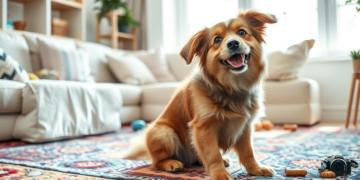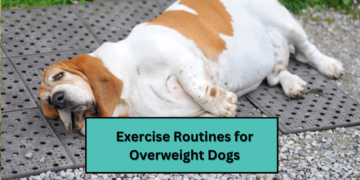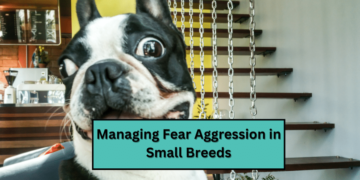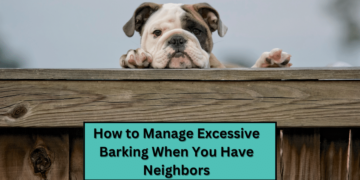If you have just adopted a puppy, you need to know a lot of things. This is the time when you are probably more scared than a puppy! Obviously, you have a lot of questions. Where should puppies sleep is one of them. Well, the situation is rather simple, but you still must know the basics and additional facts in order to make your puppy as comfortable as possible. Stay calm and try to enjoy this process.
Understanding Puppy Sleep Needs
Puppies, much like human infants, require a substantial amount of sleep for their growth and development. Typically, a puppy may sleep for 18 to 20 hours a day. This sleep isn’t just a matter of rest; it’s a critical component for their physical and mental development. During sleep, puppies process and consolidate the learning and experiences they’ve accumulated while awake. This sleep time is also when their bodies grow, repair tissues, and build muscle.
It’s important to understand that puppies’ sleep patterns can be irregular. They often experience short bursts of energy followed by long periods of rest. Unlike adult dogs, puppies enter rapid eye movement (REM) sleep more frequently, which is crucial for brain development. This is the phase where they might twitch, move their paws, or even vocalize, which is perfectly normal.
Given the importance of sleep in a puppy’s life, ensuring that they have a comfortable and undisturbed sleeping environment is vital. A lack of adequate sleep can lead to issues with behavior, learning difficulties, and even health problems. Recognizing and catering to a puppy’s sleep needs is thus an essential aspect of their overall care and wellbeing.
First Things First, Where Should Puppies Sleep
We know you will want your puppy to sleep next to you in bed. This is a mistake, especially on the first couple of nights. If you allow him to sleep there, eventually you will have a dog that wants to take over control of your bed. It will be your/his bed or nothing else. Where should puppies sleep?
The first night they should sleep in their own bed. This is the best option you can choose and the most effective one. It may be a bit difficult or problematic but it is mandatory. There is plenty of time when your puppy will sleep next to you in your bed.
Use Crate
A crate is probably the best option where your puppy should sleep. It is safe, a puppy will like the calm environment and will get plenty of sleep. Puppies have tons of energy. In order to get that energy and use it, they do need a lot of sleep. Small puppies sleep up to 20 hours per day so you can get a better idea.
If you decide to use a crate, make sure to do a couple of things. First, place old newspapers under the bedding. Then, place the waterproof mats under the crate if you place them on the carpet. If you keep the crate on the tiles, you don’t have to do this. The old newspaper will soak water and urine. With puppies, these accidents do occur more often than you may believe.
You will have to place a crate in a quiet part of the home. It should be a corner or any other area where there is no noise, distractions, or anything else. Some owners like keeping the crate in the kitchen. Tiles make cleaning much easier and it is quiet at night. Just keep the crate away from the refrigerator if you like night snacks.
Do You Have Other Dogs?
If you have more than just one dog, the situation is a bit different. You should try to keep the crate in the same area where other dogs are. They need to become friends. Usually, this works well and you will have no issues.
But it is possible that your older dogs don’t like the puppy or they are not prepared for a new member of the family. If this happens, keep the crate in the next room and allow them time to adapt. This is a stressful and complicated thing for puppies and older dogs.
There is no need to tell you that you should do this very slowly! Some dogs are aggressive towards puppies. Others can hurt them by accident. The third will accept the puppy immediately. There are countless variations. As such, you need to be careful and take your time. This is not something you can do instantly.

The First Night
The first night is usually the biggest problem for new owners and the hardest time for puppies. It is common that a puppy will cry, be sad, and be upset all day, especially at night.
When you change your home, you will need time to adapt. A dog needs the same thing. A puppy is like a child, so he needs the same thing but with more precautions and effort from you. In addition, a puppy will play throughout the day. But at night he will stay alone, and this will trigger fear and cause stress.
Some of you believe that allowing your puppy to cry as long as he needs is normal. This was a standard a while back. Today, it isn’t, and it can cause all sorts of problems. Your puppy can develop separation issues and more. Instead, you will have to move the crate (if you use it) to your room. A puppy will sense your presence, and it will be easier for him.
The adjustment is not fast. Some puppies need 2-4 days to accept the new home and start considering this as their own territory. Others may need much longer. It is possible that a puppy cries for a couple of weeks. This is rare, but possible.
Other Things You Need To Know About
Here we can see two additional things that you will want to implement in this scenario. The first one is equipping the crate. You have to get a crate that is ideal in size (not too big nor too small) and add toys that he will enjoy playing with. Some dog owners like having multiple crates all around the house.
This can work well, and it will help your puppy, but not always. Some puppies will want and need one crate where they feel comfortable and safe. They don’t like another crate.
Preparing the puppy for sleeping is mandatory. You will have to give him a snack before placing him in the crate. Always place him to sleep at the same time, without exception. When you place him in the crate, turn off the light. This will tell your puppy that playing time is not possible anymore.
Training Puppies to Sleep Through the Night
Training puppies to sleep through the night is a gradual process that requires patience and consistency. Here are steps to encourage your puppy to have a restful, uninterrupted night’s sleep:
Establish a Routine:
Like human babies, puppies thrive on routine. Set a fixed bedtime and stick to it every night. This helps set your puppy’s internal clock and makes it easier for them to fall asleep at the designated time.
Create a Comfortable Sleeping Area:
Ensure that your puppy has a comfortable, quiet, and safe place to sleep. This could be a crate, a dog bed, or a designated area in your room. The key is to make it a positive space where they feel secure.
Limit Evening Activity:
Avoid rigorous play or stimulating activities an hour before bedtime. Instead, opt for calm, soothing interactions to help your puppy wind down.
Last Call for Bathroom Breaks:
Take your puppy out for a final potty break right before bed. This minimizes the chance of accidents during the night and helps your puppy understand that bedtime is approaching.
Use a Comfort Item:
Sometimes, having a comfort item such as a blanket or a toy that smells like their littermates or mother can provide added security for your puppy and help them sleep better.
Ignore Attention-Seeking Behavior:
If your puppy whines or barks during the night, avoid giving them attention immediately. Wait until they are quiet before checking on them. This teaches them that making noise won’t result in attention.
Gradually Increase Alone Time:
If your puppy struggles with being alone, gradually increase the time they spend in their sleeping area without you. Start with short intervals during the day and gradually increase the duration.
Positive Reinforcement:
Praise and treat your puppy when they go to bed on command or sleep through the night. Positive reinforcement encourages good behavior.
Consistency is Key:
Stick to the routine and rules you set. Consistency helps your puppy understand what is expected of them and makes the training process smoother.
Remember, every puppy is different, and some may take longer to adjust to sleeping through the night. Be patient and maintain a calm, positive approach to help your puppy feel secure and comfortable in their sleeping routine.
FAQs

At what age can puppies generally sleep through the night?
Most puppies can start sleeping through the night around 4 months of age, but this can vary based on the individual puppy and its training.
Is it okay for puppies to sleep in bed with me?
While it’s a personal choice, having puppies sleep in their own space can help establish boundaries and independence. It also prevents potential accidents in your bed.
How long do puppies sleep each day?
Puppies can sleep up to 18-20 hours a day. They have high energy bursts followed by long periods of rest.
What if my puppy cries at night?
Initially, it’s normal for puppies to cry at night as they adjust. Comfort them without overstimulating, and ensure they have a bathroom break if needed. Consistency in ignoring attention-seeking behavior at night is crucial.
Can a feeding schedule affect a puppy’s sleep?
Yes, avoid feeding your puppy right before bedtime. A proper feeding schedule earlier in the evening can aid in digestion and prevent nighttime restlessness.
Is it normal for puppies to have restless nights?
Occasionally, yes. Just like humans, puppies can have off nights. However, if restlessness is frequent, it might indicate an underlying issue needing attention.
How can I make my puppy’s crate more appealing for sleep?
Make it comfortable with bedding, a favorite toy, and maybe a clothing item with your scent. Treats and praise when they go into the crate can also create positive associations.
Should I wake my puppy up to go potty during the night?
In the early stages of house training, it might be necessary. However, as they grow and can hold their bladder longer, they should be able to sleep through the night without a bathroom break.
How do I know if my puppy isn’t getting enough sleep?
Signs include excessive crankiness, lethargy during awake periods, or changes in behavior. If you’re concerned, consult with your vet.
Can a night light help puppies sleep better?
Some puppies might find a night light comforting, especially if they are in a new environment. However, it’s not essential for all puppies.
The Final Word
In conclusion, understanding where puppies should sleep and addressing their unique sleep needs is a key aspect of raising a happy and healthy puppy. Creating a comfortable, safe, and consistent sleep environment helps establish good habits and ensures your furry friend gets the rest they need to grow and thrive. Whether it’s a cozy crate, a dedicated puppy bed, or a specific room, finding the right sleep solution is essential for your puppy’s well-being and your peace of mind.
Remember that this is a huge change for a puppy so he will need a lot of time and your patience. There is no way you can speed things up.

















































Discussion about this post